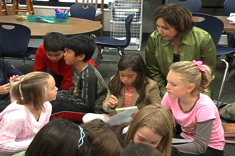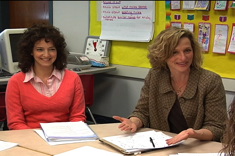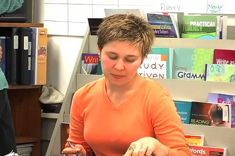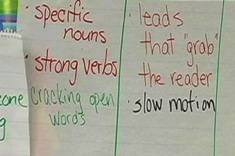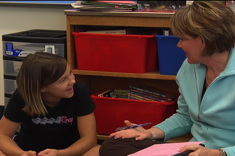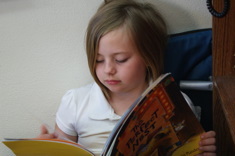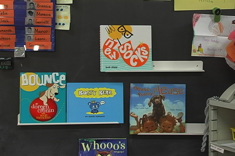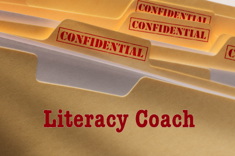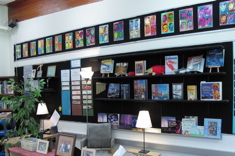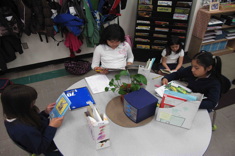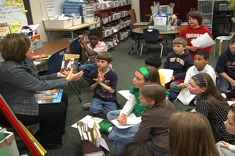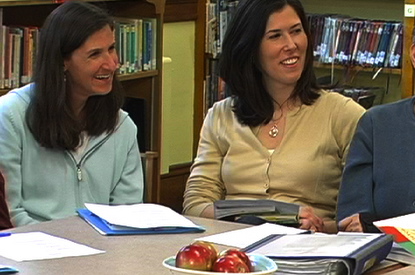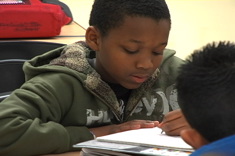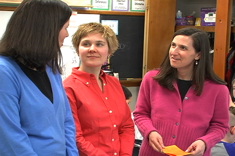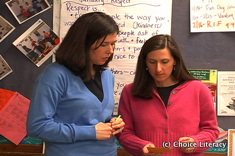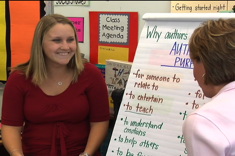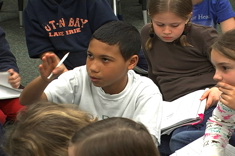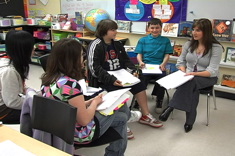Articles
Here is where you’ll find all the latest print features from our contributors. If you’d like to browse specifically by grade level, topic, or contributor, you can use the links in the right sidebar.
Latest Content
Helping Students Find Their Own Mentor Texts
Franki Sibberson helps her students learn how to evaluation and discover their own mentor texts in her grades 3 and 4 literacy workshops.
Making the Rounds: Visiting Everyone
Jan Miller Burkins finds getting into a classroom isn't that different from getting into a party. It's your choice whether you crash your way in or get a legitimate invitation – and how you get in certainly affects how you're perceived once you're there.
Collecting Stories: Opening Activity and Icebreaker (PRINT DOWNLOAD)
Ruth Shagoury’s collecting stories icebreaker is a fun yet thoughtful activity for opening a meeting or all-day professional development event with energy and reflection. It gets everyone moving around the room, talking with colleagues, and best of all, focused on students and curriculum.
Looking Back to Move Forward: The Plan Book Scavenger Hunt for Literacy Leaders
Jennifer Jones is as busy as the rest of us at the end of the school year. Yet she finds time spent in a “scavenger hunt” of her planning book/calendar is essential for setting realistic goals and scheduling professional development priorities for next year.
January New Teacher Group Update: When Life Happens
Preparing for a forced sick day with her daughter, Jennifer Allen is reminded that the culture of professional development in her school is something she can depend on.
Writing Strengths Anchor Chart
Suzy Kaback's anchor chart activity builds a sense of community and peer editing connections in her middle school classroom.
Conferring with Children
“The Sisters” (Gail Boushey and Joan Moser) talk about how their views have changed over time when it comes to conferring.
The Anticipation Guide: A Tool for Study Group Leaders
Suzy Kaback finds the Anticipation Guide is the “little black dress” of study group and staff development leaders, taking any literacy leader seamlessly from the classroom to PLCs and faculty meetings.
Shopping With Ana: Expanding Our Definition of “Just Right” Books in Grades K-2
Franki Sibberson learns from her daughter about emerging readers and book choice.
Time for Reading
Shari Frost describes how literacy coaches shadowed children to get a sense of how much reading students were doing.
Planning for a Year of Author Studies (TEMPLATE)
Meaningful reading, writing, speaking, and listening comes out of thoughtfully planned author studies. Gayle Gentry shares her thinking and planning.
Conferring in the Zone: Vygotsky’s Zone of Proximal Development and Writing Conferences
The zone of proximal development continues to be an important frame for noting where writers are at and what's next. Ruth Shagoury lists questions at different phases of writing to help nudge writers forward.
Literacy Coach Confidential: What Can I Do About Poor Attendance at My Study Group?
When attendance drops in study groups, here are some ways to get it back on track (or take a new direction entirely).
Room for Beliefs: Linking Classroom Design and What We Value
Debbie Miller questions what our classrooms say about our beliefs and practices, and suggests how to bring our designs into closer alignment with our values.
Just Because They Can Doesn’t Mean They Should: Choosing Age-Appropriate Books for Literature Circles
Kids might be missing out on great books that are a better fit if they are reading books just because they can. Shari Frost delivers a smart reminder about challenging advanced readers.
Hooked on Series: Great Series Books for Transitional Readers
Finding the right series for a transitional reader is a gift. Franki Sibberson shares her favorite finds.
Boosting Attendance at Study Groups
Brenda Power shares advice from teachers that are building and maintaining inquiry study groups with adults.
Letters from Home: Letting Families and Friends Teach Us
Brenda Power and Ruth Shagoury use letters from home to learn about students and build community.
Honor Books: Helping Children and Families Build Bridges Between Home and School
What does Andie Cunningham gets when she mixes pictures from the classroom, messages from families and poetry from teachers? A wonderful recipe for an Honor Book you’ll want to try with your own students.
Collaborative Teaching: Finding Common Ground First
These are important questions for teachers entering into a co-teaching situation to consider in advance.
Literacy Coach Confidential: Teachers Resent Me – What Can I Do?
We address the issue of resentment by considering how leaders can stay optimistic and use questions to open up a discussion.
Night Terrors: Let the Coaching Begin!
Jennifer Allen realizes how much we miss if we wait till the start of the school year to begin mentoring colleagues. When she helps new teacher Jess deal with nightmares about the first day of school, she discovers some big themes they will be mulling together all year long.
Anchor Books for Modeling Writer’s Craft in Workshops
Franki Sibberson shares her favorite books for modeling writer’s craft in her classroom.
Opinion Exchange: A Workshop Activity for Study Groups
New teachers need so much their first year and having the ability to be heard and have their opinions valued is right up there. Ruth Shagoury offers a respectful exchange to meet that need.
Professional Development Needs Assessment Inventory
Teachers help define a literacy coach's role through a needs assessment survey.
Playing with Word Work: Inviting Students to See Playful Language in Books (BOOKLIST)
Franki Sibberson brings fun into word work through the use of picture books with her 5th graders.
The Curricular Support Menu: A Collaborative Tool for Assisting Colleagues
This support menu is a fun way for literacy coaches to survey teachers for support requests.
Planning for K-3 Author Studies (eGUIDE)
Gayle Brand knows the power of author studies and shares her activities, unit plans and year-long glances to support students identification as readers and writers.
Flexible Grouping: When, How, and Why
Max Brand explains how daily student grouping can be both planned and spontaneous.
Tips from the Pros on Starting Your Own Writer’s Notebook or Teaching Journal
If you asked yourself, “What in this world do I never want to forget?” what might go in your notebook? Brenda Power offers routines and rhythms to write like the pros.
Browse Content By
Type
Category
- Assessment Tools
- Big Fresh Archives
- Booklists
- Choice Numeracy
- Classroom Design
- Common Core
- Community Building
- Conferring
- Content Literacy
- Digital Literacy
- English Language Learners
- Equity
- Family Relations
- Free Samples
- Guiding Groups
- Leadership
- Literacy Coaches
- Mentor Texts
- Minilessons
- New Teacher Mentors
- Podcasts
- Poetry
- Quote Collections
- Reading Strategies
- Self Care
- Struggling and Striving Learners
- Talking and Listening
- Teacher Study Groups
- Teaching Reading
- Teaching Writing
- Word Study and Vocabulary
Author
- Melissa Quimby
- Nawal Qarooni
- Gwen Blumberg
- Julie Cox
- The Lead Learners
- Hannah Tills
- Josie Stewart
- Ruth Metcalfe
- Mallory Messenger
- Becca Burk
- Jodie Bailey
- Vivian Chen
- Mary Brower
- Tiffany Abbott Fuller
- Stephanie Affinito
- Ruth Ayres
- Leigh Anne Eck
- Heather Fisher
- Shari Frost
- Julie Johnson
- Suzy Kaback
- Gigi McAllister
- Shirl McPhillips
- Melanie Meehan
- Cathy Mere
- Debbie Miller
- Tara Barnett and Kate Mills
- Tammy Mulligan
- Dana Murphy
- Bitsy Parks
- David Pittman
- Brenda Power
- Heather Rader
- Matt Renwick
- Mandy Robek
- Christy Rush-Levine
- Gretchen Schroeder
- Jen Schwanke
- Brian Sepe
- Katherine Sokolowski
- Stella Villalba
- Jennifer Vincent
Grade Level
Choice Literacy Membership
Articles
Get full access to all Choice Literacy article content
Videos
Get full access to all Choice Literacy video content
Courses
Access Choice Literacy course curriculum and training

